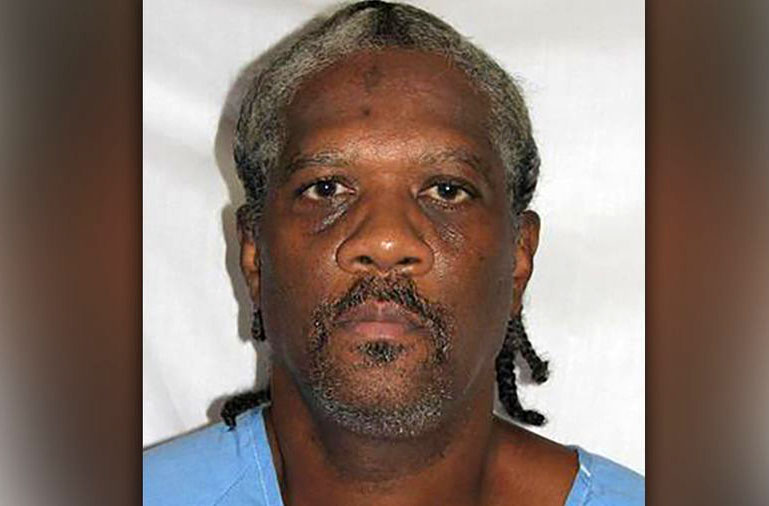Cooper applied for clemency in 2016, prompting the new flurry of activity in his case.
On Friday, Newsom overrode prosecutors’ objections and ordered new DNA tests on several key pieces of evidence, including hairs collected from the victim’s hands and the crime scene, two separate blood samples, fingernail scrapings from the victims and a button found in the house that authorities say the murderer hid out in after killing the victims with a hatchet and knife.
“I have reviewed the record in this case, including information regarding the evidentiary value of additional forensic testing submitted by Mr. Cooper’s representatives, and the People, acting through the San Bernardino County District Attorney,” Newsom wrote in the executive order ordering the new testing.
“I take no position regarding Mr. Cooper’s guilt or innocence at this time. Especially in cases where the government seeks to impose the ultimate punishment of death, I need to be satisfied that all relevant evidence is carefully and fairly examined,” he added.
In December, former Gov. Jerry Brown ordered tests of four other pieces of evidence and appointed a retired Los Angeles Superior Court judge as special master to oversee the unusual case. The testing ordered in December has not yet been conducted.
Cooper’s attorney, Norman Hiles, said the additional testing and the tests ordered by Brown will all be done through the special master.
“We are extremely pleased and gratified that this has happened quickly,” Hiles said.
But San Bernardino County District Attorney Jason Anderson said he is disappointed by Newsom’s decision.
“Unfortunately, over time it seems the victims’ desire for justice in this case matters less and less. This office did not feel any additional DNA testing should have been ordered,” Anderson said in a written statement. “Prior DNA testing that Mr. Cooper sought, agreed to and claimed would exonerate him have all confirmed Mr. Cooper’s guilt and that Mr. Cooper’s allegations of evidence tampering were unfounded.”
The case attracted national interest after a New York Times columnist undertook an investigation.
Afterwards, U.S. senators Kamala Harris and Dianne Feinstein — and reality television star Kim Kardashian — urged officials to allow re-testing. Harris opposed that re-testing when she was the state attorney general.
But it’s not just outside observers who have raised questions about the case.
In 2004, the Ninth U.S. Circuit Court of Appeals halted Cooper’s planned execution and ordered DNA testing of the bloody T-shirt that will now be re-tested again.
After Cooper’s DNA was found on the shirt, a majority of the appeals court reaffirmed his death sentence. But four members of the court, led by Judge William Fletcher, in 2009 issued a blistering dissent, arguing that the trial court had discounted key evidence — including the presence of a chemical used to preserve blood, which was found in one of the blood samples.
That indicated, the dissent stated, that police may have taken a blood sample of Cooper’s and sprinkled it on a T-shirt to frame him.
Fletcher’s dissent stated that there is “substantial evidence that three white men, rather than Cooper, were the killers. Some of the evidence was introduced at trial. Some of the evidence, even though exculpatory, was deliberately destroyed by the (San Bernardino County Sheriff’s Department) and was therefore not available for use at trial. Some of the evidence, even though exculpatory, was concealed from Cooper and therefore not available for use at trial.”
That evidence included the fact that the girlfriend of a convicted murderer, Lee Farrow, told police that Farrow was wearing a T-shirt identical to the bloody shirt found near the murder scene on the day of the killings. But later, when Farrow returned home, the girlfriend said, he was wearing bloody coveralls. She turned those coveralls over to police, and told them that his hatchet was missing. A hatchet was one of the weapons used in the murder.
The coveralls were later discarded by police, and were never tested for DNA evidence.
In the dissent, Fletcher went one-by-one through all the pieces of physical evidence used to convict Cooper and concluded that in numerous cases it was likely that police planted the evidence to frame Cooper after the fact.
“San Bernardino County Sheriff’s Department investigators were confronted with a horrifying multiple murder, far worse than any that had previously occurred in the county. They had an obvious suspect … They drew what seemed, at the beginning, a sensible conclusion — that Kevin Cooper, the escaped prisoner, was the murderer,” he wrote. “Once (sheriff’s) investigators drew that conclusion, they manipulated and planted evidence in order to convict Cooper. In the course of their investigation, they discounted, disregarded, and discarded evidence pointing to other killers.”
Fletcher closed by noting that Cooper has now been on death row for nearly half his life.

